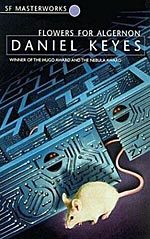
![]() Wintermute
Wintermute
6/14/2011
![]()
But little Mouse, you are not alone,
In proving foresight may be vain:
The best laid schemes of mice and men
Go often askew,
And leave us nothing but grief and pain.
This is the heartbreaking journey of a man from mental retardation, to super-genius, and back to mental retardation. Charlie's (the human) peculiar path to infirmity is awe-inspiring similar in a sense to Benjamin Button's (the movie / short story).
Algernon (the mouse) is the canary in the coal mine who received the same treatment that Charlie did. Algernon's uplift is a success and foreshadows what will happen to Charlie. Slowly though, the effects of the operation receed and we see Algernon's resentment, frustration, and depression. We know and Charlie knows what is to come.
Much of the story focuses on Charlie's childhood and the stress and arguments in the family because of his condition. Besides the story-arc concerning Charlie's self-awarness and coming to grips with his particular type of mortality, the book does a fine job examining childhood emotions and fears. I found this particularly insightful.
Sad. Inspiring. Memorable. Like Benjamin Button, Flowers for Algernon examines how someone confronts and accepts the knowledge of one's inescapeable, impending mental infirmity (e.g. Alzheimers) and its impact on those we love.
"But I know now there's one thing you've all overlooked: intelligence and education that hasn't been tempered by human affection isn't worth a damn." - Charlie, Flowers for Algernon